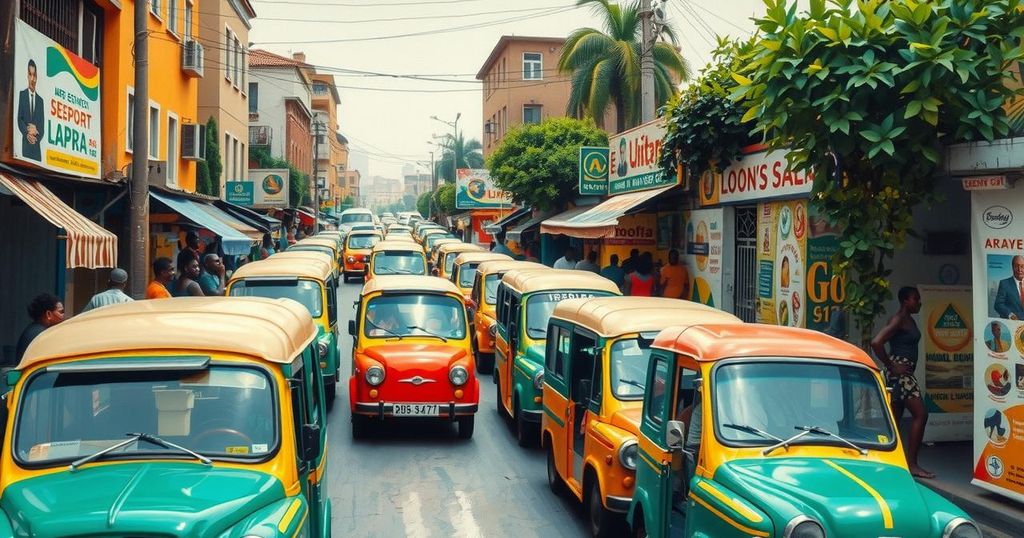‘My Father’s Shadow’ Review: Elegant Exploration of Family Amid Political Turmoil
*My Father’s Shadow*, a debut film by Akinola Davies Jr., is the first ever Nigerian movie presented at Cannes. Set on June 12, 1993—the date of Nigeria’s pivotal election—it follows two brothers struggling with a mundane day that turns extraordinary as they engage with their emotionally distant father amidst a charged political landscape. The film skillfully blends personal narrative with national upheaval, offering a stunning portrayal of Lagos and familial bonds.
Akinola Davies Jr. has made a striking entrance into the film world with My Father’s Shadow, the first-ever Nigerian film showcased at the Cannes Film Festival. Set against the historic backdrop of June 12, 1993—when Nigeria faced its first election since a military coup in the early 80s—the film presents a vivid dichotomy of hope and despair. The story follows two brothers, Akin and Remi, who, amidst this critical moment for the nation, grapple with their own familial issues while trying to stave off boredom on a seemingly mundane day.
Davies Jr. crafts a visual style that feels almost poetic, echoing the works of filmmakers like Raven Jackson and RaMell Ross. Shot by cinematographer Jermaine Edwards, the film has an intimacy that draws viewers into the brothers’ world. The sounds of nature contrast sharply with the political tension brewing outside their home. This opening sets the stage for a journey that intertwines personal and political narratives.
The mood shifts dramatically when the boys come across their father, Folarian, portrayed with complexity by Sopé Dirisu. His disconnection creates a palpable tension, reinforcing the emotional stakes. As Folarian questions them about a missing watch, his imposing figure looms large—a ghostly reminder of victory and loss within the family.
My Father’s Shadow premiered in the Un Certain Regard section and is a semi-autobiographical tale that Davies Jr. wrote alongside his brother Wale. The film beautifully encapsulates their experiences growing up with a father whose presence was often overshadowed by emotional distance. This tension serves as a broader metaphor for Nigeria’s tumultuous political landscape—a nation hopeful yet fragile.
Eventually, Folarian takes Akin and Remi deeper into Lagos, introducing them to the vibrant life of the city and its complexities. The brothers’ adventure onboard a danfo bus marks a shift from their quiet rural life. The cacophony of Lagos, filled with people passionately discussing politics, unearths the harsh realities of a country on the brink of upheaval, culminating in discussions of a recent military atrocity.
While the narrative occasionally feels disjointed, the film’s heart lies in the fleeting moments shared between Folarian and his sons. Their relationship, filled with both tension and tenderness, becomes the emotional crux of the film. The performances, especially from the young Egbo brothers, resonate strongly, capturing the volatility of childhood emotions and the complexities of familial bonds.
As night falls and the election results lead to chaos in the city, the film takes a turn toward anxiety and unrest. Folarian’s attempts to navigate this tense environment for the sake of his children creates an intense atmosphere. The skilled editing by Omar Guzman Castro expertly drives the suspense, mirroring the urgency dictated by the film’s political backdrop.
The closing scenes of My Father’s Shadow are particularly powerful, reflecting on the shattered hopes of a nation and a family. Davies Jr. weaves together the fragility of family relationships with the broader narrative of Nigeria’s struggle for democracy. Through this film, he showcases a promising flair as a filmmaker, painting a portrait of Lagos that lingers long after the credits roll.
In summary, *My Father’s Shadow* emerges as a beautifully crafted film that examines both personal and political turmoil. Akinola Davies Jr.’s debut at Cannes not only marks a significant milestone for Nigerian cinema but also resonates deeply on themes of family, loss, and the complexities of hope amidst chaos. His ability to blend intimate storytelling with larger socio-political themes sets a high bar for future filmmakers. Through its impressive visuals and heartfelt performances, the film captures a day of both mundane childhood moments and historical significance, leaving audiences with a profound sense of longing and reflection.
Original Source: www.hollywoodreporter.com




Post Comment